Invited Talks
We bring together academics and thought leaders from around the world to discuss their research related in spaces of public policy and behaviour science. By understanding these issues from multiple perspectives and in multiple contexts, we aim to build more empathetic and resilient interventions for our target populations.
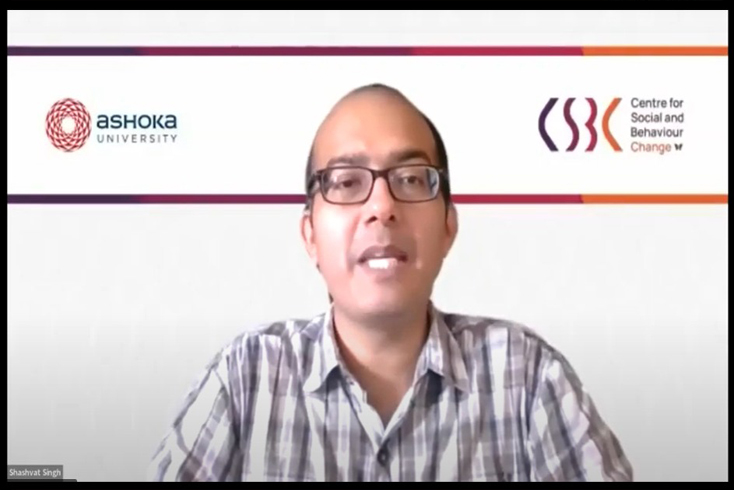
UPBIU-YCCI Webinar: BeSci in Action
The Uttar Pradesh (UP) Behavioural Insights Unit organised a webinar on behavioural science in action on July 26, 2022. It was led by Professor Ravi Dhar, Director of the Centre for Customer Insights, Yale School of Management.
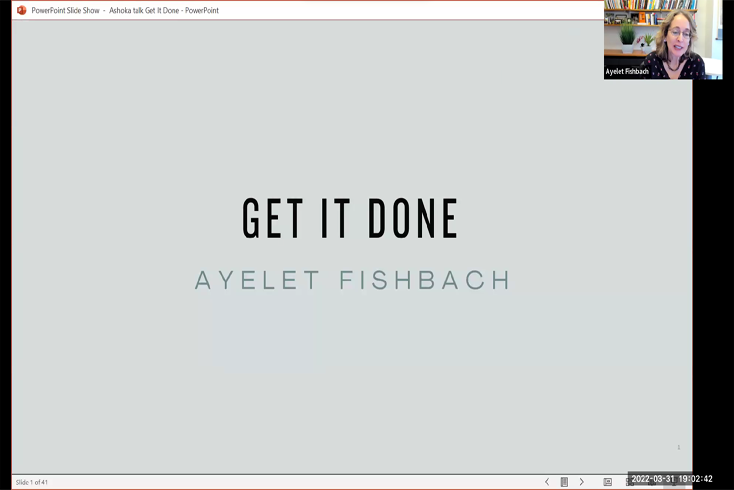
Get it Done: Surprising Lessons from the Science of Motivation
A talk discussing Dr Ayelet Fischbach’s new book on setting and achieving goals.

Migration and the Welfare State
Understanding the interplay between migration and the capacity of the modern welfare state.
Behaviourally Speaking
CSBC presents ‘Behaviourally Speaking’, a series of webinars that examine the role of behaviour science
in the effects and responses surrounding the COVID-19 pandemic. The current circumstances have led to a
new evolving dynamic around public health, information consumption, how we work and collaborate and
generally how we live.
Governments are employing multilateral strategies to mitigate the spread of the virus and its economic
impact. Our attempt is to share the views of experts through interactive discussions to better
understand the current crisis and make sense of it all.

COVID-19 and Infodemic
Nudging people to become mindful consumers of information during a pandemic.

Behaviour Change Post Lockdown
Staying ahead of the COVID-19 curve.

Leveraging the Power of Narratives to Change Complex Behaviours
A webinar on Entertainment Education as a tool for behaviour.
South Asia Social Norms Learning Collaborative
The South Asia Social Norms Learning Collaborative is a consortium that aims to build a network of researchers, implementers, donors, and others interested in working on social norms in South Asia. The Centre for Social and Behaviour Change (CSBC), Ashoka University and Project Concern International (PCI), India, host the Secretariat of this Collaborative. The vision of this initiative is to advance normative change in South Asia and allow its members and affiliates to strengthen and build capacity to improve social development programming.

Theory, Practice, Sustainability: Understanding Multiple Perspectives on Norm-Change
This panel discussion brought experienced academics, practitioners, and donors together to share insights gained from their own work and highlight best practices associated with social norms programming and research.

Workshop: Measuring Normative Shifts in Complex Environments
This workshop guided participants through the measurement and evaluation of social norms.

Workshop: Shifting Social Norms as Part of Social and Behaviour Change
This workshop built on the SA-SNLC’s promise to build capacity among local implementers as well as researchers who are new to the field of social norms programming.

Connecting the Dots: Behavioural Science & Norm Change
A discussion on how social norms influence behaviour, and the insights that can be drawn from behavioural science on norm change.

From Theory to Practice
This webinar addressed the issues of moving from theory to practice in social norms programming.

Launch event
The webinar is the launch event of the South Asia Learning Collaborative.

Workshop: Assessing Social Norms to Inform Programme Design and Implementation Strategies
This workshop built on the SA-SNLC's promise to improve practice towards the use of social norms.

Women’s Collectives as Norm Change Agents
This webinar addressed where government policies and programmes around self-help groups place norm change in the theory of change or implementation framework and how donor communities can support them.

Harnessing the SA-SNLC community’s wisdom: Norm-shifting initiatives from South Asia
This session brought together academics and practitioners who have worked on norm-shifting programmes across MHM, child marriage, FGM, and maternal and child health to share their learnings.
MODERATORS
Purnima Mehrotra
Associate Director CSBC
Sandhya Iyer
Leveraging the Power of Narratives to Change Complex Behaviours
On 20 August 2020, the Centre for Social and Behaviour Change (CSBC) hosted a webinar
titled “Leveraging the Power of Narratives to Change Complex Behaviours”. This was the
third webinar hosted by the Centre as part of its #BehaviorallySpeaking series which
aims to tackle pertinent questions in the field of behavioral science and its impact on
knowledge, attitudes and practices, globally and nationally.
The webinar delved into the importance of Educational Entertainment (EE), or
“edutainment”, as a crucial tool for social and behaviour change, foregrounding its
theories, and highlighting its history, variety, scientific study, impact and policy
implications. Each of the five panelists, with vastly different engagement with the
field, spoke to the topic from their experiences. This allowed the audience to engage
with edutainment from multiple lenses, understanding it, at once, as a thoroughly
scientific intervention, a deeply human experience, a simple medium of communication and
an opportunity for nations to address pressing development problems.
Beyond the engaging speaker presentations, the audience participation through critical
observations, commentary and questions, added immense value to the discussion.
MODERATOR
Pooja Haldea
Senior Advisor, Centre for Social and Behaviour Change
Behaviour Change Post Lockdown: Staying ahead of the COVID-19 curve
The Centre for Social and Behaviour Change in collaboration with Harvard T. H. Chan School of Public Health and Project Sanchar hosted the webinar “Behaviour Change Post Lockdown: Staying ahead of the COVID-19 curve” on 21 May 2020 to an extremely positive response by the community.
The discussion highlighted the role of behavioural strategies to support adherence to necessary protective behaviours against COVID-19 – especially at a time when lockdowns are ending across the world and the responsibility for disease prevention shifts from the state to individuals. Our panelists applied the lenses of their own experience and research to discuss strategies from perspectives of public health, psychology and behavioural science.
We would like to thank our lively audience for adding value through the numerous pertinent questions that were answered by the panel. We would also like to share some notable insights that emerged from this webinar for your reference:
- Dr. K. Viswanath of Harvard T. H. Chan School of Public Health explained how individual response to COVID-19 prevention is a balance of risk perception and competing priorities. He urged strategists to consider how the social class system and digital divide can hold people back from practicing healthy behaviours – reiterating that we need people to be a part of the solutions through a process of co-design.
- CSBC Director, Dr. Pavan Mamidi described the key levers that are used to encourage behaviours: force of law, incentives, choice architecture and, most relevant for the current scenario, social norms. He described how people attach value to norms and how implicit ‘social costs’ or explicit enforcement in the form of reminders and cues can promote positive community behaviours to curb the spread of COVID-19.
- Dr. Sanna Balsari-Palsule highlighted the need to understand psychographic variation within the population when developing behaviour strategies. She discussed how differences in personality and mental health can affect the practice of behaviours such as social distancing, and accounting for such differences can help us achieve better compliance as a society.
- Elizabeth Serlemitsos of Breakthrough ACTION, The Johns Hopkins Center for Communication Programs compared the coronavirus pandemic with her past experiences in addressing HIV and Ebola epidemics – most important difference being that today we rely on individuals to practice behaviours that might benefit others. She also highlighted the urgent need to continue delivery for other health services (such as immunisation, treatment for malaria etc.) which if not provided, can cause the loss of more lives than the mortality of COVID-19 itself.
MODERATORS
Pavan Mamidi
Director, CSBC
Smriti Verma
COVID-19 and Infodemic: Nudging people to become mindful consumers of information during a Pandemic
In our first session, our panelists discussed how the global phenomena of fake news, misinformation and disinformation have heightened in a time of uncertainty, leading to individual actions that are less than rational. The collective impact of these individual actions on public health and safety was also explored. Our panel of wide-ranging experts also shared their insights and strategies for the current crisis.
SPEAKERS
Professor Ravi Dhar
Director of the Centre for Customer Insights, Yale School of Management
UPBIU-YCCI Webinar: BeSci in Action
The webinar's objective was to understand the behaviourally informed approaches that could help increase adherence to the IFA supplementation with a special focus on the CBG (Choices-Beliefs-Goals) Framework.
The webinar was well-received by the audience that included senior officials of the UP Technical Support Unit, CSBC experts, directors and managers, and participants of several CSBC courses and NITI Aayog fellowships.
SPEAKERS
Dr Ayelet Fischbach
Jeffrey Breakenridge Keller Professor of Behavioral Science and Marketing, University of Chicago Booth School of Business
Dr Sharon Barnhardt
Director of Research, Centre for Social and Behaviour Change
Get it Done: Surprising Lessons from the Science of Motivation
A great deal of ink has been spilled on the subject of motivating and influencing others, but what happens when the person you most want to influence is you? Setting and achieving goals for yourself — at work, at home, and in relationships — is harder than it seems. With fascinating research from the field of motivation science and compelling stories of people who learned to motivate themselves, Get It Done by Dr Ayelet Fishbach illuminates invaluable strategies for pulling yourself in whatever direction you want to go — so you can achieve your goals while staying healthy, clear headed, and happy.
MODERATOR
Saksham Singh
Migration and the Welfare State
Dr Tim Müller, a quantitative social scientist and Junior Research Group Leader (Assistant Professor) of the projects "Migration and the Welfare State" and "Determinants of resilience towards radicalization in adolescence” was the keynote speaker at this webinar. Dr Pavan Mamidi, Director at the Centre for Social and Behaviour Change, gave the welcome address. Key insights from Dr Müller and his colleagues’ work on migration and welfare states include:
- Development of migration models that allow estimation of scale and composition of migration flows: Important variables that determine migration flows include the GDP of the destination country and population of the destination country. Further, flows are more likely between countries with similar spending, indicating a status maintenance motive.
- Examining the performance of different migration-, integration- and welfare-state regimes and their effects on integration outcomes: Two causal pathways predict migrant disadvantage (1) Restrictive immigration policy and high employment protection; (2) Restrictive immigration policy and a developed welfare state.
- Development of fiscal models that allow the assessment of the current and future fiscal balance of migration: It was found that immigrants in Germany take up fewer benefits (in terms of social assistance) than they are eligible for, which has implications for migrant disadvantage and poverty.
- Estimating the acceptance of immigration while taking into account immigrants as contributors to the welfare system and welfare recipients: It was found that the higher the percentage of migration-related news articles is, the more negative the attitudes are about migration. However, this effect is lower than the effects of income, political leanings, and gender, among others, on attitudes about migration.
The session also included a discussion on the factors that bolster narratives against migration, including media effects and political motivation, and policies that support migrant workers.
SPEAKERS
Dr. Anjalee Kohli
Technical Director, Passages Project at the Institute for Reproductive Health
Indrajit Chaudhuri
Country Director of PCI India
Shweta Bankar
Senior Fellow – Qualitative Research, at the Centre for Social and Behaviour Change (CSBC)
Andy Bhanot
Director of Social and Behaviour Change Communication of PCI India
Siddhartha Swarup
India Lead, Social Impact, Education, and Communities at Facebook
Dr. Khairul Islam
Regional Director, South Asia Region at WaterAID
Dr. Ravi Verma
Director at International Center for Research on Women (ICRW)
Poonam Muttreja
Executive Director of the Population Foundation of India
Launch Event
Given the recent growth of the number of researchers and practitioners working in the
field of social and behavior change, it is a critical moment to make the latest
knowledge and evidence on social norms widely accessible and provide opportunities for
practitioners and researchers from different disciplines and sectors to share and
produce knowledge. Social norms expertise currently rests in a small group of global
“experts,” which is inadequate to meet the demand for assistance to guide social norms
practice and research. This learning network will support effective programming that
addresses the norms that influence critical health and development issues by
strengthening social norms expertise at the implementation level, where it matters most.
The webinar is the launch event of the South Asia Learning Collaborative, officially
inviting participation from interested organizations and people working or wanting to
work with social norms in South Asia.
FACILITATORS
Dr. Anjalee Kohli
Technical Director, Passages Project at the Institute for Reproductive Health
Indrajit Chaudhuri
Country Director of PCI India
Courtney McLarnon-Silk
Senior Program Officer, Center of Child and Human Development, Georgetown University's
Jamie Greenberg
Program Officer, Center of Child and Human Development, Georgetown University's
Shweta Bankar
Senior Fellow – Qualitative Research, at the Centre for Social and Behaviour Change
Sushmita Mukherjee
Director, Gender and Adolescent Girls, PCI India
Assessing Social Norms to Inform Programme Design and Implementation Strategies
Given the recent growth of the number of researchers and practitioners working in the
field of social and behaviour change, it is a critical moment to make the latest
knowledge and evidence on social norms widely accessible and provide opportunities for
practitioners and researchers from different disciplines and sectors to share and
produce knowledge.
This workshop built on the SA-SNLC's promise to improve practice towards the use of
social norms. Our facilitators guided participants through the assessment of social
norms to inform programme design and implementation strategies through two sessions
spread out over two days.
The takeaways from the workshop were:
- Existing formative assessment approaches may overlook norms. If shifting norms is important to your program, completing a norms assessment is a must.
- It’s important to understand how norms influence program behaviours.
- Norms assessments answer, for a given context: what the relevant norms are, who the reference groups are, why people comply with norms, and which norms are the most important.
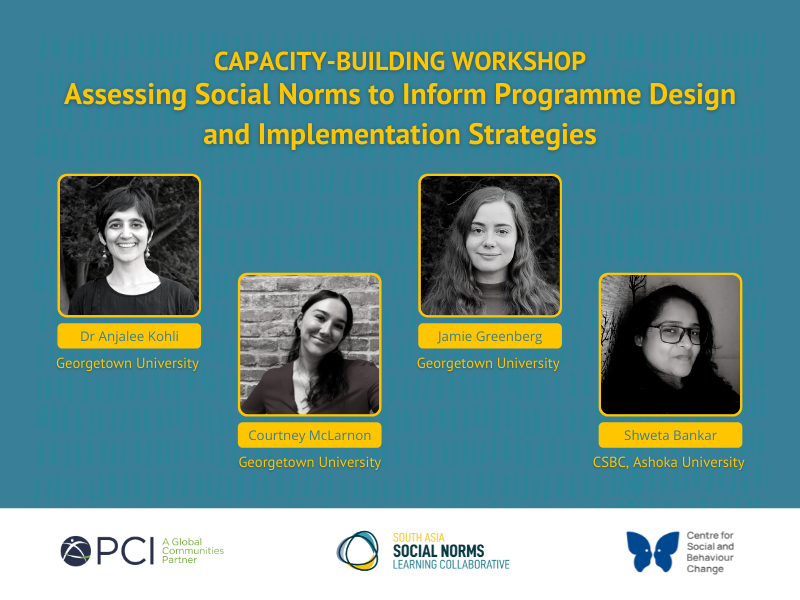
SPEAKERS
Andy Bhanot
Director of Social and Behaviour Change Communication at PCI India
Balamurugan D.
IAS, CEO, JEEViKA
Madhu Khetan
Program Director, PRADAN
Madhu Krishna
Deputy Director, Bill & Melinda Gates Foundation
Rangoli Gupta
Associate, Centre for Social and Behaviour Change
Dr Sharmila Neogi
Advisor (Adolescent Health and Gender), USAID
Dr Sharon Barnhardt
Director of Research, Centre for Social and Behaviour Change
Sushmita Mukherjee
Director, Gender and Adolescent Girls, PCI India
Women’s Collectives as Norm Change Agents
There has been a rise in women’s collective action in South Asia. The focus of these
programmes is uplifting women’s social and economic status, and they have presented an
opportunity to foster women’s groups for collective action. A gamut of evidence from
this region shows how such grassroots platforms of women have pushed boundaries to shift
regressive social norms. However, there is not enough discussion on the nuanced role of
women’s collectives in altering social norms. While many of these programmes do not
intend norm shifts, they do change norms while working towards their objectives. The
theory of change of such interventions or programmes, once drawn, can be adopted by
policymakers and implementers to ensure large scale impact.
The session focused on the role of the collectives as agents of social and gender norm
change. While such collectives often do not pursue norm change as an outcome, their
activities result in normative change by challenging patriarchal regimes. Through this
session, the SA-SNLC brought together a panel of key stakeholders to discuss the role of
women’s collectives in catalysing norm change.
The takeaways from the workshop were:
- Existing formative assessment approaches may overlook norms. If shifting norms is important to your program, completing a norms assessment is a must.
- It’s important to understand how norms influence program behaviours.
- Norms assessments answer, for a given context: what the relevant norms are, who the reference groups are, why people comply with norms, and which norms are the most important.
SPEAKERS
Kamani Jindasa
Executive Director and Founder, Shanthi Maargam
Dr Nurullah Awal
WaterAid, Bangladesh
Madhu Khetan
Program Director, PRADAN
Reetika Revathy Subramanian
Mumkin App
Priya Goswami
Mumkin App
Farhad Ali
Digital Green
Sanjay Kumar
Digital Green
Rani Yadav
Breakthrough, India
Nayana Chowdhury
Breakthrough, India
Harnessing the SA-SNLC community’s wisdom: Norm-shifting initiatives from South Asia
To mark a year since the launch of the South Asia Social Norms Learning Collaborative,
this webinar was an interactive session that leveraged the knowledge within the
community.
Norm-shifting programmes or programmes that have significant norm-shifting components
are few and far between in South Asia. This session will brought together academics and
practitioners from reputed organisations in the region to discuss their work on
norm-shifting and share their learnings.
SPEAKERS
Radharani Mitra
Global Creative Advisor at BBC Media Action
Ramakrishnan Ganesan
Senior Private Sector Advisor for Abt Associates.
Suniti Neogy
Senior Technical Advisor, Gender Justice team, CARE USA
Dr. Zeba Mahmud
Senior Advisor, Strategic Partnership and Knowledge Learning at Alive & Thrive
From Theory to Practice
This webinar addressed the issues of moving from theory to practice in social norms programming. Our panellists, experts in norm change programming in the areas of nutrition, gender, and health, shared their knowledge of how best to navigate these challenges with examples from successful on-ground interventions. They used case studies of their research, highlighting the underlying theoretical frameworks, ToCs, their interventions, and results, to demonstrate best practices associated with social norms programming. Awareness of the same will help increase the effectiveness of interventions addressing social norms in the field.
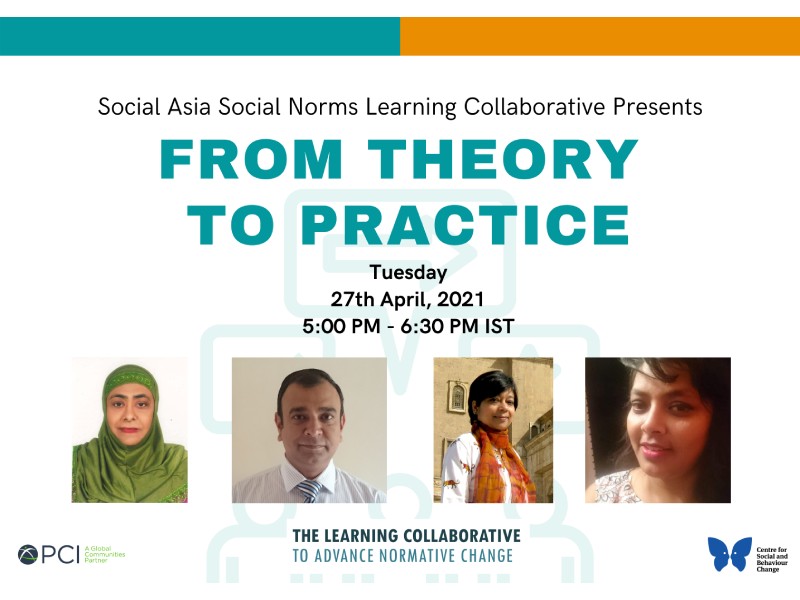
SPEAKERS
Andy Bhanot
Director of Social and Behaviour Change Communication at PCI India
Dr. Cristine Legare
Professor of Psychology and Director of the Center for Applied Cognitive Science (CACS) at the University of Texas at Austin
Shekhar Menon
Senior Program Officer, Behavioural Insights, India Country Office of the Bill & Melinda Gates Foundation
Dr Pavan Mamidi
Director, Centre for Social and Behaviour Change
Connecting the Dots: Behavioural Science & Norm Change
The dynamics between societal and individual expectations, beliefs and preferences play
an elemental role in shaping behaviour. There are several cognitive and behavioural
biases that hinder people’s motivation, ability or even opportunities to perform various
actions. Social norms can be leveraged within such behaviour change interventions to
positively influence and create impact! The study of social norms intersects with
behaviour science at many points: norms signal appropriate behaviour and set behavioural
expectations or rules within a group of people. They are also key to many behaviour
change interventions, especially when the goal is en masse, sustained behaviour change.
Using a 360-degree behaviour change approach with a combination of communication and
non-communication interventions can have the desired results.
In this webinar, hosted by the South Asia Social Norms Learning Collaborative (SA-SNLC),
the panellists discussed the ways in which social norms influence and regulate
behaviour, and shared insights that can be drawn from behavioural science on the subject
of norm change.
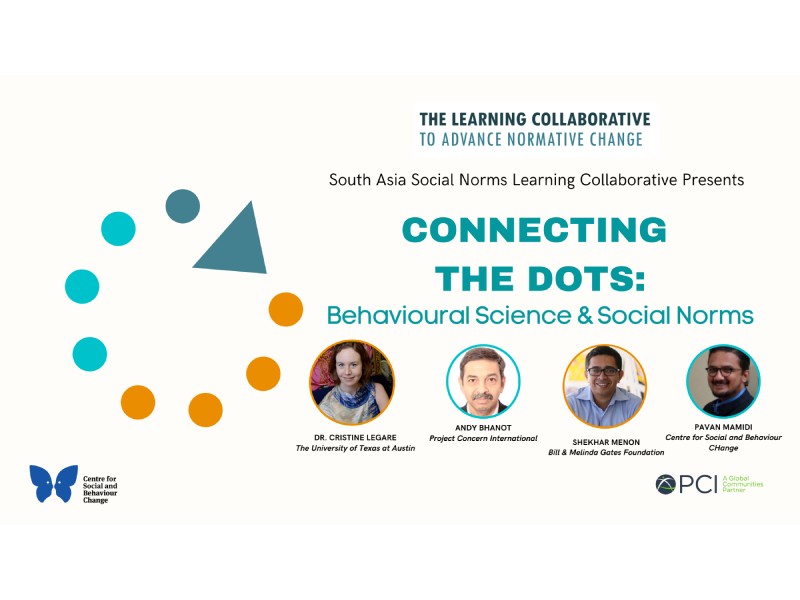
FACILITATORS
Dr. Bryan Shaw
Senior Research Officer, Passages Project, Institute for Reproductive Health (IRH) at Georgetown University
Andy Bhanot
Director of Social and Behaviour Change Communication at PCI India
Dr. Anjalee Kohli
Technical Director, Passages Project at the Institute for Reproductive Health
Workshop: Shifting Social Norms as Part of Social and Behaviour Change
This workshop built on the SA-SNLC’s promise to build capacity among local implementers as well as researchers who are new to the field of social norms programming. Through two sessions spread out over two days, our facilitators imparted crucial foundational knowledge on social norms to participants. The highly interactive session format allowed in-depth exploration of and discussion on the fundamentals of social norms and provided budding researchers with key insights on implementation and budding implementers with a basic theoretical grounding of their work.
The takeaways from the workshop were:
- Defining social norms and distinguishing them from attitudes/beliefs and behaviours.
- Identifying the importance of normative influence between and within different layers of the socio-ecological framework for health and well-being.
- Explaining, in practical terms, how social norms influence health and other behaviours.
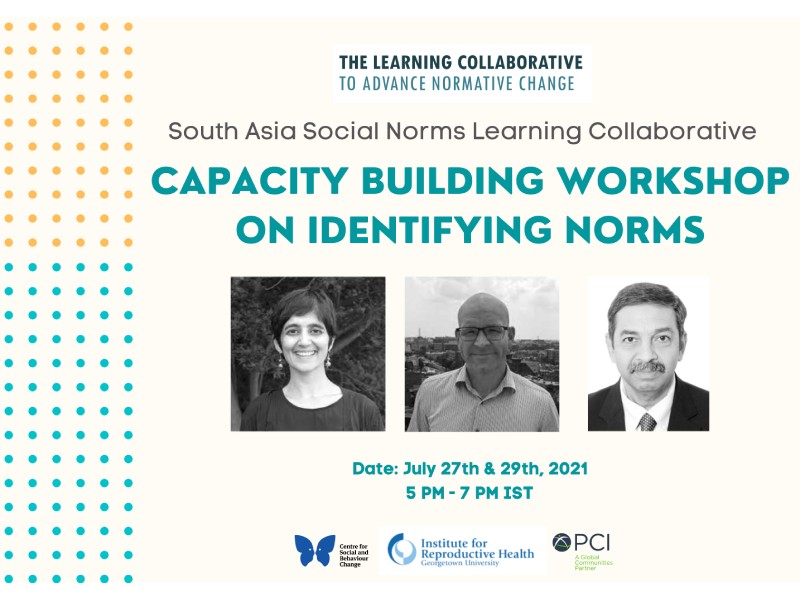
FACILITATORS
Dr Anjalee Kohli
Courtney McLarnon-Silk
Senior Program Officer, Center of Child and Human Development, Georgetown University
Jamie Greenberg
Program Officer, Center of Child and Human Development, Georgetown University
Measuring Normative Shifts in Complex Environments
This workshop built on the SA-SNLC's promise to improve practice towards use of social norms. Our facilitators guided participants through the measurement of social norms. The highly interactive session format allowed in-depth exploration of design, implementation, and evaluation challenges and solutions for community-based social and behaviour change (SBC) projects engaging in, expanding, or planning to expand normative change efforts.
The takeaways from the workshop were:
- Practitioners should use an approach best suited to respondents (i.e., single item, scales or indices, vignettes, other participatory methods).
- Social change is complex; monitoring and evaluation methods need to address complexity.
- Data should be collected and used in real time to guide implementation

SPEAKERS
Nayan Chakravarty
Chief of Party with USAID’s MOMENTUM Country Global Leadership: India-Yash
Dr Sanna Balsari-Palsule
Senior Research Specialist, Centre for Social and Behaviour Change
Shekhar Menon
Senior Program Officer, Behavioural Insights, India Country Office of the Bill & Melinda Gates Foundation
Theory, Practice, Sustainability: Understanding Multiple Perspectives on Norm-Change
The role of social norms in influencing and shaping human behaviour is beyond debate. Behaviour change practitioners and policymakers recognise that to influence behaviours, it is important to understand how social norms work and to understand how they interact with numerous other influencers or drivers of behaviour situated in complex ecosystems. This is especially true in collective multicultural societies like those found in South Asia, where religion, caste, class, ethnicity, tribalism, and regionalism influence group norms in different ways.
It is equally important to recognise that norms researchers need to be empathetic to the people and cultures being researched so that the right behaviours and the right drivers are captured, more so when we realise that norms that are often resistant to change. Last, the role of donor organisations cannot be underscored in ensuring the smooth running of research studies or intervention programmes. Thus, this event was an honest and introspective discussion between researchers, practitioners, and donors, one that is vital for sustainable and conscientious norm shifts going forward.